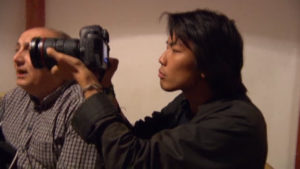
By Ed Diokno
An Asian Canadian photojournalist’s experience at the U.S. border shared with Canada exposes the extent to which Homeland Security has impacted our lives.
Journalist Ed Ou, who has covered the news in some of the most dangerous areas on the planet, was surprised to be turned away at the U.S.-Canada border on his way to cover the protests at Standing Rock, North Dakota.“It’s very sad because I spent the last 10 years working in very authoritarian regimes in the Middle East where we do have to be very careful about the fact that we are journalists,” Ou told The New York Times. “So I usually have to be very careful in places like that, and I didn’t think that I would have to do the same thing in the States. That’s the last place I should have needed to do that.”
What happened next should send chills up the back of journalists and advocates of a free press. In a lengthy Facebook entry, he wrote:
At the US Customs booth at the airport, I was directed to secondary, where I was immediately asked about the last time I was in Iraq, and why I was so interested in covering Standing Rock. I was then given a list of every country I had been to for the last 5 years and asked to write in detail what I was doing in each trip. I answered quite openly because all my travel could be matched with a published article, and it was nothing they couldn’t have Googled.
A few hours in, they asked me to unlock my phones – and to quote them, “we just need to look into your cell phone to be sure there’s no photos of you posing next to some dead body somewhere.”
I politely declined, citing that as journalists, we have sources that we are obligated to protect, much like doctors have a responsibility to patient privacy, and lawyers have to protect their clients confidentiality. The tone immediately changed. They said they had the right to search everything I bring through the border, including passwords to phones, and threatened that if I didn’t provide them, I could be denied entry.
I was then subject to more interrogations where I was asked questions like “what extremist groups I have met with, how many people I have seen die, and whether I have been ‘approached’ by any government agencies in the Middle East”. They also searched through all my bags and photocopied documents I had on me.
Six hours later, I was told I was being denied entry, but they did not have to tell me the reasons.
“Ed’s treatment was unjustified and unlawful,” said the ACLU in a press release. “Although CBP has the authority to stop and search travelers at the border for the purpose of identifying people who are inadmissible or engaged in criminal activity, the officers exceeded that authority. They had no legitimate cause to detain Ed for six hours, interrogate him about his professional activities, copy his diary, or search his phones.
“That abusive and harassing conduct is all the more troubling given that the officers apparently conditioned Ed’s admission to the U.S. on his willingness to assist them in searching his phones,” said the ACLU.
He wasn’t held for being a journalist, he said. He answered all their questions in a professional manner It wasn’t until they wanted information from his cell phone when he drew line. Ou said that if the U.S. can do that to journalists, imagine what foreign governments can do to engineers. Can they gather information from their laptops, which might have top secret information in them?
“They can just capture your data. Everything on your cellphone. And your cellphone has absolutely everything about your life. That’s a lot of power you’re giving the government under the auspices of security,” he said.
“And at the end of the day, it is up to all of us to stand up for our right to privacy and a free press wherever we are,” said Ou.

